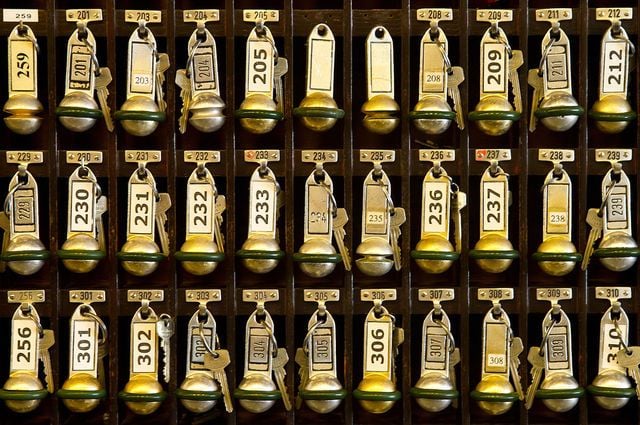Is Hotel Technology Lagging Behind other industries?
18 experts shared their view
For over a decade I have heard industry pundits, consultants, other experts, and myself say that the hospitality industry lags behind other industries in innovation, investment, and adoption of new technologies. Is this really the case? If so, what are the barriers, issues, and conflicts that have led to this situation? More importantly, what should we do about it?
The hospitality industry is definitely lagging behind other industries when it comes to technology. The check-in and check-out process for example has not fundamentally changed since, well ... ever ... In my opinion there are three main reasons (or should we say excuses?) for this, as well as many smaller ones.
1. The fragmented nature of hotel ownership means that it's hard to get investment. Many different entities need to be convinced before a major commitment can be made.
2. We are geographically spread and we have to deal with many different regulations, cultures and systems. This makes it challenging to build something that works everywhere.
3. Hotels don't spend enough money on technology. We remain at the bottom of the 'spend as a percentage of revenue' benchmark, and a low earning potential combined with a high threshold to enter is not a very attractive proposition for a technology company.
Having said this, we are not the only industry that faces these issues so maybe we just need to try harder....
A big part of this issue is due to the fragmented stakeholder situation in our industry. There is a) the brand (Franchisor) and their priorities to push the brand distribution and franchise fees. b) the management company that aims to maximize revenue and profit (as it will in most cases increase their income of management fees); and c) the owner or asset manager of the hotel who's priority is to maximize the EXIT value of the property.
All these stakeholders compete for the available investments (FF&E) funds.
At the end of the day the owner (asset manager) pays the cheque and will have the ultimate decision about the investments - and if his investment cycle is only 5 years he will not invest in anything with an ROI longer than his ownership will last.
In my opinion the shortage of labour in our industry will make many asset managers re-think their investment strategy. Hotels (or brands) that use automation to overcome staff shortages will be looked at favorable and receive more funds for technology investments and ongoing maintenance.
Better to run an automated hotel than to NOT run a hotel because you cant get staff to service the guests!
The industry is behind not in technology, but in the way we think about and value technology. There is certainly modern and innovative tech out there, and through E20X we see that there is no shortage of great ideas and startups eager to implement them. Many in the industry are, however, risk-averse when it comes to modern and cutting-edge tech, and for a long time I've heard executives (even CIOs) make the claim "We aren't in the IT business." Too often, technology decisions are made by hotel operations - people that are not technical architects - and are based more on what feels safe, what has been used before, or what the majority of others are using. This is a fundamental, and circular, problem.
Unwillingness to invest properly in a well-architected solution, or take any chances with new and small companies, makes it more difficult for these new technologies to survive. Tolerating the limitations of the legacy systems we use desensitizes us and forces us to accept technical limitations as just a cost of doing business. Wash, rinse, repeat. To break the cycle, we have to change the way we invest in technology, and especially our tech people. Your technical infrastructure and software should be designed by an IT architect, and you shouldn't budget as a percentage of gross profit or force a tangible ROI for every tech project. Most importantly, don't ignore the extremely important fact that we ARE in the IT business, and must invest accordingly.
Yes, hotels and hotel groups are somewhat slow to replace their old systems or add new technology. While system vendors and consultants may lament this, the reality is that technology is a relatively low (but increasing) priority for many hotel operators. That will soon need to change.
We have been content to keep our systems as long as they functioned reasonably well. A new generation of connected systems - connected to each other and to external entities - is emerging. Early adopters of that new generation will gain competitive advantage. The future will soon deliver integrated platforms where the technology “knows” the guest (CRM), “knows” the rate to offer (RMS), and instantly assembles the appropriate photos, text and personal data into an appealing booking presentation (CRS). The exchange will feel like a fully personalized conversation. Moreover, the quality of the conversation and the offers presented will steadily improve as Artificial Intelligence and machine learning are applied. That same availability of personalized data and ongoing guest communication will be present throughout each hotel stay.
Many of our traditional vendors will be unable to keep pace with this technology evolution. Their systems will cease to be sufficient, will cease to be competitive.
There are a number of factors to consider; 1. Ultimately the hospitality industry is a real estate business. Most rental property owners like to avoid heavy continued investment into the asset, if at all possible. For that reason any decision to make further investments into the asset are heavily considered. That includes technology. As a result of the process progressive technology adoption is slowed through the natural investment cycles of real estate ownership. I'm not of the view that owners are anti-technology. It has more to do with asset management in general and technology becomes a victim of circumstance.
2. As an industry and particularly from a technology perspective, generally there is a pre-disposition to wanting to be somewhere between 2nd place and last place in relation to new technology. I've always found the desire to be anywhere but first a fascination. Not too many businesses in an industry would not strive to be No. 1. For the most part everyone is waiting around for someone else instead of taking a leadership position.
3. As a result of 2. above the industry in general does not reward innovation. Many large and small provider company's commence with the right idea in mind for bringing large steps forward in capability to market. They are often crueled by a lack of courage in industry adoption and either disappear or fall back to the pack. There are many examples of early to market products that disappeared for something that eventually became main stream.
What to do about it?
A. Encourage a change in attitude by industry toward technology investment and an appetite for a reasonable level of risk that would encourage innovation. Today's technology is far more reliable than that of the past. Many of the traditional risks don't exist on the same level due to lead time to failure and survivability of technology platforms.
B. Applaud and recognise the early adopters as an industry. Nothing improves without change and if one organisation wont take the 'risk' then they can at least support those that do. A rising tide floats all boats.
C. View technology adoption as a competitive advantage. Today's technology is the business process and the operational platform. Technology provides the opportunity for being faster, higher, stronger than your competitors. The window of opportunity to be able to do things in your business that other's cannot through a lack of willingness to adopt can give years of business capability before the rest come in 2nd to last.
D. Have a go! People talk about 'what if something goes wrong?'. Things go wrong now. In my view better for things to go wrong with additional operational power and capability than waiting for your competition to surpass your own business capability. At the end of the day our industry technology platforms are going 'right' more than 99% of the time. Why focus on less than 1%?
Despite statements to the contrary, there is and has been for many years a wealth of great technology available to the hospitality industry. More coming all the time, despite the challenges outlined above. Don't lament what could have been. Get on board and move your business and the industry forward.
Hotel technology needs to be segmented into two parts: 1) Operational use and 2) Guest use. Operationally, technology has improved since it was first implemented into hotels during the 70's - but some of the fundamental processes revolving its use - have not. One of the key processes being check-in [where for those old enough to remember] has evolved from a type written registration card, a Whitney rack, a manual credit card imprinter with carbon paper and a metal key - to a tablet and integrated credit card swipe and a plastic key card. However, for the most part, the people who now use these systems [have not] and are so dependent on the tech, that they've lost the art of welcoming the guest, or thanking them when they leave.
A Hotel has become no busier in 2019 than it was in 1975. You had 800 rooms and you filled 800 rooms. And most of the time [back then], without queues... Oh, and don't get me started on the promise of going paperless.
Kiosks placed in the lobby to queue-bust as you encounter at airports have added to delays. Mobile check-in is not as smooth as it should be, and mobile key adoption, I understand, is still in the single digits.
Without doubt, where things have improved is integration to the OTAs via channel managers and revenue management systems – which is a huge focus by most GMs and corporates - since it directly affects the bottom line, bonuses and shareholder returns.
PoS has also come a long way, and often I use a sushi restaurant that gives me a QR code on arrival, I process my order via a web browser, and magically my food appears on an internal railway system. Quick and simple.
Guest tech has been hit and miss with one of the fundamental pieces in a room - still to some extent performing the same function 50 years on - the TV. Yes, it may have a few extra bells and whistles but at the end of the day, it's still a TV. Having said that, it's used less and less because people bring their own devices and content.
The phone is a dinosaur, and the once omnipresent music player dock has all but disappeared. An expensive fad like DVD and Blu-ray players.
In room tablets vendors may tell you they have some traction and increase F&B revenue but is it really sufficient to justify?
To me, and my pragmatic approach - tech spend must be meaningful. It must positively enhance the guest experience and help the operation be more efficient. It's no longer a driver like it used to be. After all, you won't select a hotel because it has a 60” flat screen or a B&O dock. But you will be very unhappy if there's no power socket at the bedside, great Wi-Fi and an excellent shower plus comfy bed. Add a Nespresso machine and it's almost a perfect place to stay.
It's no wonder asset managers push back on tech spend…
Back to basics folks!
This is a two sided problem. Hoteliers are not investing enough into technology and will keep using it till it breaks or stops working. There are no or limited return on investment calculations that are used. Investment in technology is also too low and does not receive the priority that it should. On the other side the technology that hoteliers are offered is mostly not up-to-date and too expensive. Also the past closed system architecture taken by some companies has led to integration problems and a lot of headaches for hotels. What we need to do is get hotels to understand that a major starting point is adopting technology that is cloud based (this is better for them) that has open API mind-set with technology companies that want to grow their technology but also build a better Eco system with partners as well.
I see three main reasons why hospitality technology is lagging behind other industries: 1) Reluctance to invest in digital technology: This reluctance to invest in digital technology comes from the lack of understanding that we are serving technology obsessed travel consumers who demand a hotel technological experience be equal or better to what they have at home. In this digital age, hospitality technology goes way beyond the flat-screen TV or the property PMS, and should focus on guest-facing digital technology applications and devices like streaming media hubs, voice assistants, messaging capabilities, mobile-first property website, personalization technology, and one-to-one pricing and marketing applications.
2) The technology and data fragmentation in hospitality is another big challenge and impediment to progress the industry faces today. The typical hotel uses a myriad of vendors that do not talk to each other, and in many cases do not even know each other. Guest data lives in multiple “data islands” that do not talk to each other: PMS, CRM, CRS, Social Media, Web Analytics, Marketing Data, and BI. Very few properties and hotel companies can boast a single view on customer data with live data feeds from ALL touchpoints with the traveler.
3) Lack of proper education and professional development opportunities on digital hospitality technology and the latest technology innovations, trends and best practices. How many hospitality schools today teach hospitality technology courses? Almost none.
While I certainly agreed with this statement in the past, I don't believe that today it holds true as much. The reason? Hotel operations have become much more sophisticated and, as a result, require more technology to support their initiatives. While more time consuming, hoteliers traditionally could operate their property with manual processes that did not require technology.
Take for example revenue management. It is now common practice for hospitality organizations of all types to dynamically price their inventory based on factors other than just their occupancy. Other factors are taken into account such as historical bookings and pace, city-wide occupancy, and other data. Technology is needed in order to process this information and make quick decisions. The same applies to guest loyalty and personalization. Without a CRM it is difficult to understand the total guest value, their preferences, and booking patterns to meet their needs. Furthermore, as the cost of technology increasingly becomes more affordable I believe Hotel Technology will begin to catch up with other industries in the future.
Two words: legacy systems. Most of the core systems that hotels use were built decades ago. They are slow, expensive, difficult to use, and completely unable to connect with other systems or 3rd party applications. In other industries, customers have demanded an alternative, and innovators have delivered, effectively kicking these dinosaur systems into extinction where they belong. What has replaced them is leaner, cloud-based, ultra connected and ultra easy-to-use technology.
Technology that doesn't require huge set-up costs, interface fees, or rollout/implementation projects. Hoteliers are only just beginning to demand an alternative to the legacy systems that they have become accustomed to, and innovative new players are stepping in to deliver. The next generation of hotel technology that is coming up will completely change the industry from laggard to leader.
The answer is yes, but it's not just about being behind in tech – the hospitality sector is behind on accepting that they need to evolve into a tech-centric industry. Just because something is the norm within hospitality doesn't mean it works best for your specific business structure, and relying on something as standard as a PMS system to accomplish all technological tasks becomes an inhibitor of innovation, as opposed to an enabler of success.
A hotel's financial investment on their IT department is also obsolete – on average, hotel groups only spend 1.3% of their annual budget on IT, again due to the idea that 1.3% is the “standard” necessary spend within the hospitality industry. To add to the complexities, the owner-operator structure is a key contributor to the lack of technological progression. All in all, if we're able to adapt the mentality of hoteliers to be tech-based, streamlined advancement will follow.
For decades the big hotel companies try to create new services, designs, brands, loyalty programs in order to grow mainly through franchise contracts. They try to convince investors, banks and owners that their brand offering is unique. The problem though is, more or less everything is about the hardware, the hotel product itself and not about the customer, the guest. And since the big ones are the bench mark for the smaller ones this affect the whole industry down the smallest individual property.
Over the last 20 years especially OTA's introduced a completely different approach to the hotel industry. Instead of having the product in mind, they have the guest, the booker as their centrepiece and they try to do everything to attract them on an individual level with customized services, sales and marketing actions, websites, content etc.
Hotels are way behind the digitalization and this not because of budget constraints. The CEO's have to understand that the world has changed, and individualization is everything and it comes from the data around us. To use data, the organizations must be adopted first to become customer centric, new organizational structures and decision-making processes to run a Central Data Management strategy must be in place and this is only doable if the CEO understands this and leads the necessary change process. Today this is not the case, IT, Marketing, E-Commerce, Operations are fighting against each other instead of working together.
The number of new, exciting players that have emerged within the hotel technology space in recent years is testament to the fact that the industry isn't held back by a lack of creativity, a progressive mind or an entrepreneurial spirit. The unspoken challenge that has universally crippled, and continues to cripple, hotel technology innovation is connectivity – or the lack thereof. It is pervasive.
We now operate in a world where personalisation is no longer a trend; it's a consumer demand and expectation. Yet, hoteliers can't access all of their guest data from one source as they have a multitude of disparate systems that can't speak to each other. Consequently, the technology partners of those hotels, themselves, are challenged with delivering value to hoteliers as they can't access the guest data they need from the hotel's property management system. How effective can your upselling tool be, for example, if it can't determine which guest booked what and when? There are now hundreds of hotel management systems out there, and each services hundreds if not thousands of hoteliers across various geographies. Until the data within those systems become more accessible to other hotel applications, we cannot truly solve for the fragmentation that exists within the hotel technology landscape. Fortunately, there are now solutions such as SiteMinder Exchange which are providing unprecedented connectivity and are creating a much more open ecosystem that will benefit the entire industry.
Additionally, we must remember that hoteliers are generally not IT experts, nor do they have the capacity or resources to properly evaluate and implement the technology they select. They don't even have the time to educate themselves on the latest solutions, how those solutions should be implemented, and what the ROI should be. So, on top of solving the connectivity challenge, the hotel technology industry has a role to play in providing educational support to the hoteliers we serve.
For over a decade, I have heard industry pundits, consultants, and other experts say the hospitality industry lags behind other industries in innovation, investment, and adoption of new technologies. Is this really the case? If so, what are the barriers, issues, and conflicts that have led to this situation? More importantly, what should we do about it?
Answer: The space has become incredibly diverse and dynamic over the last few years. When I look at other industries, I feel everyone struggles with the same issues—data silos, outdated technology, data not flowing freely, etc. Many people complain about the lack of innovation in the industry; however, I feel the hotel technology space is buzzing. It's an exciting time to be in the industry.
The industry is both decentralized and disintermediated, which means very unique challenges. I think the biggest challenge is twofold—one, the pendulum of power between OTAs and hotels has not yet reached equality. Hotels were blindsided by the power of OTAs and their huge investments in technology, and it took some time to realize technology is essential to differentiation. Two, lots of people influence decision-making in the industry—from hotel owners to asset managers to operators and brands. For every technology investment at the brand level, a huge effort has to go into creating buy-in from owners and franchisors to actually commit to the investments. That takes time and doesn't allow for nimbleness.
What is needed is vision, strategy, and guts. With the industry being in the midst of transformation, the most successful hoteliers are the ones who foresee long-term trends, understand their impact, and invest into their infrastructure of today for tomorrow, even if it means going against conventional wisdom. Sameness will not result in success.
In 2015 McKinsey released a study on the digitization of industries in the US, and the hospitality industry was at the bottom of the chart ranking only above construction and agriculture. Even government and education had a better “overall digitization” score. Although there are is no new data since then, it feels like the industry is catching up fast. You only have to look at the number of hotel tech vendors at ITB to see the difference. And this feeling is backed up if you look at the investment.
According to Skift, the travel tech industry globally has raised more than $5 billion in venture capital in 2018, up from $1.6 billion in 2013. But still, we as hotel tech vendors talk about the lack of technology in hotels and scratch our heads when we look at the legacy tech still commonly found at hotels we are visiting.
I believe part of the 'hotels lag in technology' problem is the perception we have as hotel tech vendors. We are surrounded by smart engineers, data experts and the latest developments in tech, so when we compare our standards to others it is easy to point out the difference. Tom Goodwin, Head of Innovation at Zennith, sums this up perfectly: “I'm not sure when our industry became so obsessed with what's shiny over what's profound. I'm not sure when we became so keen to use buzzwords that we didn't check what they mean — or that they even have any meaning at all.”
So having that said; is there then no opportunity for hotels to improve their technology? There absolutely is! Almost all hoteliers I talk to want better working technology and according to a survey of travelers by Oracle and Phocuswright, two-thirds said investment in hotel technology that enhances the guest experience is “very or extremely important. So the question is why this is not happening. When we recently asked hoteliers during a webinar with Avvio, the biggest technology challenge was “systems that don't talk to each other”. And this seems like a problem we as hotel tech will need to solve.
The hospitality industry has a higher resistance level for change than other industry verticals. I don't think it's about investment. I think it is driven by the fear of a disconnect from data. Hospitality is a 24/7 operation and needs to be always ready with data; be it for guests, operations or the state.
Tech companies should work with its hotel partners and have a structured migration plan for technology. It's very important that a technology migration is done with the least disruption of data. Roll out of Cloud and Native mobile solutions, also need SOP and behavior changes. We as technology providers have a large role to play. Our new technology solutions should be interoperable allowing phased migration. Hand holding through the change especially in emerging markets with local presence is very important.
Twenty to thirty years ago, most industries envied hotels and their knowledge of the customer. Hotels knew who their guests were as well how they spent their money while on property. However, hotels have historically been more willing to spend money on enhancing the guest experience as opposed to their back end systems. This has impeded the growth of cutting edge technologies being implemented widely across the industry.
Over the last few years however, hotel companies are beginning to understand the true value of the information that is scattered across their various systems. They are beginning to follow the lead of other industries where technologies such as self-service business intelligence, machine learning, and AI are already well established. As mentioned by Arne Sorenson at the NYU International Investment Conference in 2018, disruption has started and “we're in an absolute War for who owns the customer” with Facebook, Google, Amazon, and other digital empires. While it is true that the hotel industry is a bit late to the party, we will benefit from the fact that other industries have matured these technologies which will help us catch up fairly quickly.
I'm not of the mind to accept that hotel technology is lagging behind other industries, I believe the issue is one of hesitation to adoption, not innovation and availability. As a point of reference, we had a fully functional room booking engine available for hotels to use on their websites in 2003, but it took a decade before adoption became as ubiquitous as it is now; imagine a hotel without a booking engine today (yes there may be a few laggards, but a very few).
Fast forward to today, we offer multiple variants of mobile and guest engagement tools, including mobile check-in, checkout, digital registration, mobile housekeeping, and mobile management tools, all as integrated add-ons to our Maestro PMS, yet adoption is growing very slowly. This is not a factor of price, as these tools are extremely cost-effective for our clients, but internal challenges around the project management of implementing these offerings to guests (marketing, branding, education), are often more overwhelming to plan then the use of the technology itself. This is further aggravated by concerns over security and privacy, including PCI and GDPR. Hotel technology may appear to be lagging, but this is more about hotels ensuring that the available technology is used in thoughtful and productive ways for guests, than the actual availability of that technology.


















